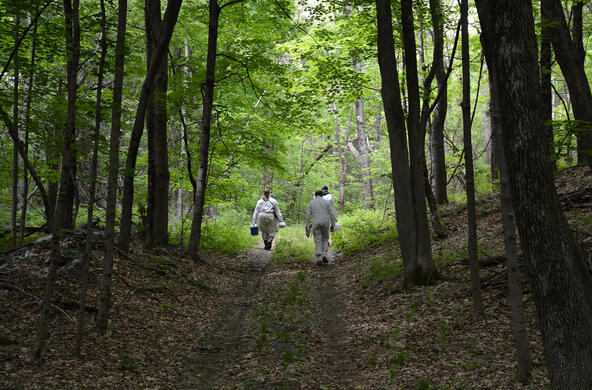Are invasive species killing us? This question must sound a little over the top if you think that invasive species are just garden pests, but history is filled with examples where they've killed humans. West Nile virus has killed more than 1,500 people since it arrived in the United States in 1999, the potato blight (an invasive fungus) led to the starvation of more than a million people in Ireland, and newly introduced diseases such as smallpox may have killed as many as 80 percent to 90 percent of the indigenous peoples of the Americas. So, yes, invasive species kill people — and lots of them.
Today, I want to look at a more subtle way that invasive species may be killing us. The emerald ash borer is a small insect accidentally brought to the United States from Asia about 20 years ago. It has killed millions of our ash trees and will kill millions more all over North America. Now a new report in the American Journal of Preventative Medicine suggests that it may also have killed more than 20,000 Americans.
This study was based on a careful analysis of death records in counties with and without ash borers, before and after the borer invasion. The study found that invaded counties had more than 20,000 extra deaths after the borers invaded (but not before), even after accounting for factors such as income, age and ethnicity. The authors are quick to caution that this association does not prove ash borers caused people to die. It is just the obvious explanation.
How can this be possible? The borers don't attack people, and the dead people weren't killed by falling branches. Instead, the authors of the study suggest that extensive losses of ash trees caused beauty and environmental quality to decline in affected areas, which led to 20,000 extra human deaths from cardiovascular and respiratory problems.
Many scientific studies have shown that people benefit from trees and other contact with nature. Contact with nature can reduce stress, reduce pain and speed healing in surgical patients, and produce healthier babies. People exercise more if their neighborhood has lots of trees. Street trees improve air quality in cities. Studies like these suggest plausible links between the invasive insects, the dying ash trees, a decline in environmental quality and more human deaths.
I can think of two reasons why this sort of thing is so poorly appreciated. First, the links between nature and human well-being are complex and indirect. It doesn’t take a fancy study to see the causal link between a knife and the death of someone found with that knife between his shoulder blades. However, such deaths from a single, obvious cause are less common than deaths from multiple indirect causes. It’s much harder to ascribe a cause of death to someone who succumbs to cardiovascular disease that was a result of many factors — age, genetics, diet, lifestyle and now the loss of street trees. But these 20,000 people are dead just as surely as if they had turned up with knives in their backs.
Second, nature is owned by everyone and by no one. No individual or company makes money if trees and parks keep people a little healthier, so there is no immediate reward for anyone to conduct or highlight studies that show how nature benefits human health.
In contrast, if Merck owned nature, so that you had to come up with a copay each time you went for a walk or sat by the bank of a brook, you can bet that there would be plenty of research studies on the benefits of contact with nature. And we’d hear about the health benefits of nature all the time. “Do you suffer from depression, stress or cardiovascular problems? Ask your doctor if a walk in the park could be right for you.”
So this new study reminds us of two truths we should not overlook. First, we need to be careful about invasive species because they really can kill us. Even more important, it is worth jealously guarding the quality of the environment around us, even in cities (or maybe, especially in cities) because it affects us in the most profound and personal way — through our own health.








